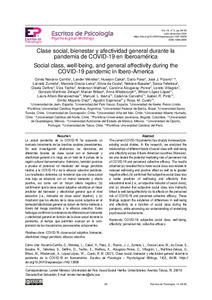Por favor, use este identificador para citar o enlazar este ítem:
https://repositorio.uca.edu.ar/handle/123456789/13706| Título: | Clase social, bienestar y afectividad general durante la pandemia de COVID-19 en Iberoamérica Social class, well-being, and general affectivity during the COVID-19 pandemic in Ibero-America |
Autor: | Navarro-Carrillo, Ginés Méndez, Lander Cakal, Huseyin Páez, Dario Pizarro, José J. Zumeta, Larraitz Gracia Leiva, Marcela Da Costa, Silvia Basabe, Nekane Telletxea, Saioa Delfino, Gisela Techio, Elza Mathias, Anderson Alzugaray-Ponce, Carolina Villagrán, Loreto Martínez-Zelaya, Gonzalo Bilbao, Marian Wlodarczyk, Anna López-López, Wilson Alfaro-Beracoechea, Laura Ibarra, Manuel. L. Carvalho, Catarina Pinto, Isabel. R. Moyano-Díaz, Emilio Espinosa, Agustín Cueto, Rosa. M. |
Palabras clave: | COVID-19; BIENESTAR; AFECTIVIDAD; CLASES SOCIALES; RIESGO | Fecha de publicación: | 2021 | Editorial: | Universidad de Málaga. Facultad de Psicología | Cita: | Navarro-Carrillo, G. et al. Clase social, bienestar y afectividad general durante la pandemia de COVID-19 en Iberoamérica [en línea]. Escritos de Psicología. Psychological Writings. 2021, 14 (2). doi: https://doi.org/10.24310/espsiescpsi.v14i2.13608. Disponible en: https://repositorio.uca.edu.ar/handle/123456789/13706 | Resumen: | Resumen:
La actual pandemia de la COVID-19 ha supuesto un
marcado incremento de las brechas sociales preexistentes.
En esta investigación analizamos las relaciones de
diferentes facetas de clase social con el bienestar y
afectividad general a lo largo de un total de 8 países de la
región cultural iberoamericana. Asimismo, también pusimos
a prueba el potencial rol mediador del riesgo percibido
relativo a la COVID-19 y de la eficacia colectiva percibida.
Los resultados obtenidos (a) revelaron que una clase social
más baja se relacionó con un menor bienestar y afecto
positivo, así como con un mayor afecto negativo; (b)
confirmaron que la clase social subjetiva constituye un mejor
predictor del bienestar y afectividad general que el nivel
educativo (i.e., indicador de clase social objetiva); y (c)
mostraron que los efectos de la clase social subjetiva en el
bienestar/afectividad general se daban de forma indirecta a
través del riesgo percibido y la eficacia colectiva. Estos
hallazgos confirman la existencia de diferencias en bienestar
y afectividad general en función de la clase social durante la
pandemia, al tiempo que permiten avanzar en la comprensión de los mecanismos psicosociales subyacentes. Abstract: The current COVID-19 pandemic has sharply increased preexisting social divides. In this research, we analyzed the relationships of different facets of social class with well-being and affectivity across 8 Ibero-American countries. Moreover, we also tested the potential mediating role of perceived risk of COVID-19 and perceived collective efficacy. The results obtained (a) revealed that a lower social class was related to reduced well-being and positive affect as well as to greater negative affect, (b) confirmed that subjective social class was a better predictor of well-being and affectivity than educational level (i.e., an objective indicator of social class), and (c) showed that subjective social class was indirectly linked to well-being/affectivity via its effects on the perceived risk of COVID-19 and perceived collective efficacy. These findings support the existence of differences in well-being and affectivity as a function of social class during the pandemic, while advancing our understanding of underlying psychosocial mechanisms. |
Cobertura Espacial: | América Latina | URI: | https://repositorio.uca.edu.ar/handle/123456789/13706 | ISSN: | 1989-3809 | Disciplina: | PSICOLOGIA | DOI: | https://doi.org/10.24310/espsiescpsi.v14i2.13608 | Derechos: | Acceso abierto | Fuente: | Escritos de Psicología. Psychological Writings Vol. 14, Nº 2, 2021 |
| Appears in Collections: | Artículos |
Files in This Item:
| File | Description | Size | Format | |
|---|---|---|---|---|
| clase-social-bienestar.pdf | 444,02 kB | Adobe PDF |  View/Open |
Visualizaciones de página(s)
76
comprobado en 27-abr-2024
Descarga(s)
64
comprobado en 27-abr-2024
Google ScholarTM
Ver en Google Scholar
Altmetric
Altmetric
Este ítem está sujeto a una Licencia Creative Commons

